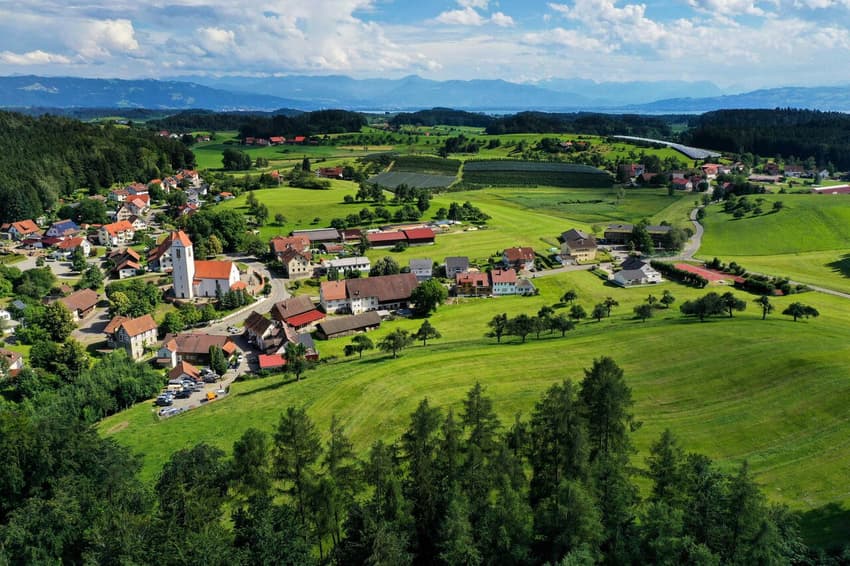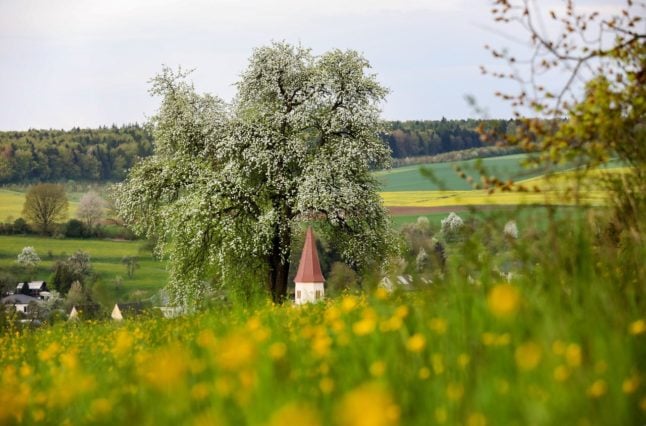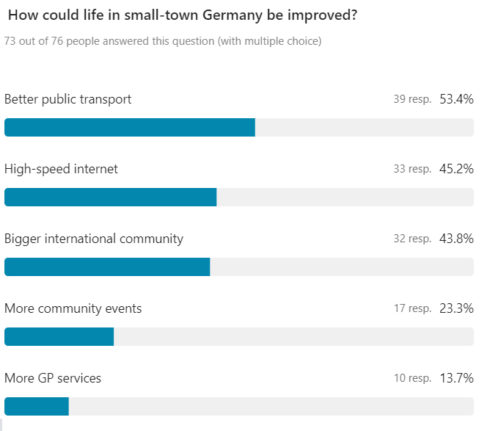'Clean, green and affordable': Your verdict on living in small-town Germany

Many foreigners make a beeline for the big cities when they move to Germany, but what's life like when you live in a sleepy town or rural village? We asked our readers to give us the lowdown.
Whether it's Frankfurt, Munich, Berlin, Germany's major cities are getting increasingly expensive - so much so that more people are starting to consider a life in the countryside.
Away from the hectic noise of the city, you may fantasise about a spacious house with a sprawling garden, a tight knit local community and unfettered access to the great outdoors. Or you may worry about being stuck out in the sticks, miles from the nearest pub or cinema, with only a handful of nosey neighbours for company.
As we discussed in our latest episode of The Local's Germany in Focus podcast, the government is currently embarking on a major drive to encourage people - and especially families - to consider such a move.
"For some people it might make a lot of sense," journalist Aaron Burnett told Germany in Focus. "The rent you are currently paying in some cities for a one bedroom flat now might have gotten you a considerably larger place years ago for your family - but more affordable places are still up for grabs in the country."
PODCAST: Why Germany wants people to move to the countryside and the €49 ticket’s rocky start
So, what's the reality of living outside of the metropoles - and should you consider it? Here's what our readers had to say.
'More for our money'
For a lot of people who said they'd made the move out to the countryside, life in Germany had started in one of the major cities. But with rents and property prices soaring, the option to get double the space for half the money was impossible to ignore.
“I can afford much more space for the same money as in Berlin," said Ian, 59, who moved to the tiny hamlet of Picher in Mecklenburg Western-Pomerania. "And when I want to go into town, it’s just over one hour by train - if they happen to actually run.”
Maurizio, 43, also found the decision to move to a rural area a no-brainer - especially when it came to the housing on offer.
He lives in what he describes as "tiny, tiny village" in the northern part of Brandenburg, surrounded by forests and greenery but within easy access of Berlin.
"I don't like the bustle of large cities and I also prefer to have a bigger property with views of fields for the same rent as a tiny one-bedroom flat in disrepair in the centre of Berlin," he told us.
Rachel, 40, lived in Munich with her partner and two children for five years - but when a new addition to the family came along, they knew it was time for a move.
“We needed more space with three kids and we knew we could get a lot more for our money outside of Munich," she said. Now, they live in the picturesque village of Altdorf near Nuremberg, enjoying the "space, quiet and nature" of the area.
READ ALSO: Holiday like a local: Five of the best camping regions in Germany
'Sense of community'
While the lower cost of living is clearly an advantage of moving to the countryside, the reasons for doing so were diverse.
Some had moved for partners, or even work and study opportunities, while others were simply looking for a clean, green environment where families could thrive.
One respondent who lives in Markt Schwaben said not being able to find nursery school places in Munich had prompted the move out to the country - but the great sense of community had encouraged them to stay put.
"Most people know each other and offer to help if asked," they explained. "One German family even went out of their way to support us in settling down and to help with German language issues, which is great. In Munich, people barely talk to strangers. Hence, for families with kids it becomes difficult to have a good life.”

The village of Riedlingen in Baden-Württemberg. Photo: picture alliance/dpa | Thomas Warnack
But by far the most popular reason for living in the countryside was to be close to nature, with around 40 percent of respondents giving this as the top benefit of picking a small town over a city.
"It's quieter, cleaner, greener, more affordable, safer, and child-friendly," said another respondent, who moved to the small Brandenburg town of Leegerbruch, adding that they now had a "standalone house with a large backyard".
A significant number of respondents (28 percent) mentioned how much they appreciated the good quality of life, while just over a quarter (26.7 percent) said affordability was key. A handful of other people said safety, a sense of community, and having more space were the big benefits they could see from moving outside of a metropolitan area.
In some cases, easier access to visa appointments was also an unexpected benefit. Corbett, 51, who moved to the pretty, mountainous district of Prien am Chiemsee, said the access to the Alps and ease of getting a visa were two key factors that contributed to a better quality of life - especially for foreigners.
'Life is very limited'
Of course, not all sides of living outside of a major city are positive, with several people mentioning things they felt could be improved about their lives in rural or small-town Germany.
In particular, a lack of public transport, cultural and social events, diversity and less open-mindedness towards internationals were the major issues people found with living in a rural location.
Of the 72 respondents to our survey, 54 percent said better transport connections would improve the countryside, 45 percent wanted high-speed internet, 44 percent were yearning for a bigger international community in the area, and around a quarter were keen for more community events.

Source: The Local Germany
“Not many people speak English," said 33 year-old Rubana, who moved out to Berne in Lower Saxony to live with her boyfriend. "There aren't many young people of my age, so it's really difficult to have a sense of community - and there's not much to do either.”
This was a complaint that came up time and time again: the lack of fun activities on offer. In short, if you're looking for a buzzing social life and options for your leisure time, a sleepy rural town may not be the ideal choice.
This was the case for Katharina, 24, grew up in the village of Winnweiler in Rhineland-Palatinate and still lives there with her parents. She told us she loves being able to walk in the forest with her dogs, but laments the dearth of things to do.
READ ALSO: How better rural transport could help solve Germany's housing crisis
"There's no nightlife, no cinemas, no cafés, nowhere to spend a pleasant afternoon at if you don’t want to go out for a walk for once," she said.
Other places where people saw room for improvement were GP services (14 percent wanted better access to doctors) and the lack of potential career opportunities.
For those who are unable to work from home, the commute to and from the nearest city was also an inconvenient slog.
“Commute times to Frankfurt for work and weekend events are longer and there's less frequent public transport," said 42 year-old Nanoo, who moved to Hainburg in Hesse to live with his wife.
He also said that interacting less with other people and experiencing language issues as an expat had given him "a general feeling of isolation, as I used to live in a big city in my home country".
The verdict
So, would our readers recommend moving out to a smaller town or even the countryside?
According to 84 percent of respondents, the answer is an overwhelming yes - though there are some caveats.
In particular, people felt that the move made perfect sense for families who were in a new phase of life and wanted more space and a higher quality of life outside of a major city.
"I'd recommend it for families with kids," said one anonymous respondent. "Because it becomes easier to settle down with kindergartens, krippe and school and bureaucracy is a bit faster."

Boats on Chiemsee in rural Bavaria. Photo: picture alliance/dpa | Matthias Balk
Katherina, 24, agrees with this sentiment.
"If you’re looking to raise a family and have kids, live somewhere quiet," she said. "But not if you are under 30 and looking for cool things to do in your free time."
In other cases, people said it depended on how dedicated you are to learning German - which is a necessity out in the countryside - and whether you truly want to integrate in the local culture.
READ ALSO: 'Focus on your strengths': Our readers' top tips for learning German
"Little English speaking forced me to prioritise learning German," said 55-year-old Rhian in Trippstadt. "I have what I need and learned the difference between want and need when it comes to groceries and household items."
In short, she said, living outside of a big metropolis is "the best way to experience German culture" - but a lot depends on your lifestyle needs and desire for convenience.
"It's all about perspective really," she added.
Thank you so much to everyone who completed our survey. Although we weren't able to use all the responses, we read them all and they helped inform our article.
Comments (1)
See Also
Whether it's Frankfurt, Munich, Berlin, Germany's major cities are getting increasingly expensive - so much so that more people are starting to consider a life in the countryside.
Away from the hectic noise of the city, you may fantasise about a spacious house with a sprawling garden, a tight knit local community and unfettered access to the great outdoors. Or you may worry about being stuck out in the sticks, miles from the nearest pub or cinema, with only a handful of nosey neighbours for company.
As we discussed in our latest episode of The Local's Germany in Focus podcast, the government is currently embarking on a major drive to encourage people - and especially families - to consider such a move.
"For some people it might make a lot of sense," journalist Aaron Burnett told Germany in Focus. "The rent you are currently paying in some cities for a one bedroom flat now might have gotten you a considerably larger place years ago for your family - but more affordable places are still up for grabs in the country."
PODCAST: Why Germany wants people to move to the countryside and the €49 ticket’s rocky start
So, what's the reality of living outside of the metropoles - and should you consider it? Here's what our readers had to say.
'More for our money'
For a lot of people who said they'd made the move out to the countryside, life in Germany had started in one of the major cities. But with rents and property prices soaring, the option to get double the space for half the money was impossible to ignore.
“I can afford much more space for the same money as in Berlin," said Ian, 59, who moved to the tiny hamlet of Picher in Mecklenburg Western-Pomerania. "And when I want to go into town, it’s just over one hour by train - if they happen to actually run.”
Maurizio, 43, also found the decision to move to a rural area a no-brainer - especially when it came to the housing on offer.
He lives in what he describes as "tiny, tiny village" in the northern part of Brandenburg, surrounded by forests and greenery but within easy access of Berlin.
"I don't like the bustle of large cities and I also prefer to have a bigger property with views of fields for the same rent as a tiny one-bedroom flat in disrepair in the centre of Berlin," he told us.
Rachel, 40, lived in Munich with her partner and two children for five years - but when a new addition to the family came along, they knew it was time for a move.
“We needed more space with three kids and we knew we could get a lot more for our money outside of Munich," she said. Now, they live in the picturesque village of Altdorf near Nuremberg, enjoying the "space, quiet and nature" of the area.
READ ALSO: Holiday like a local: Five of the best camping regions in Germany
'Sense of community'
While the lower cost of living is clearly an advantage of moving to the countryside, the reasons for doing so were diverse.
Some had moved for partners, or even work and study opportunities, while others were simply looking for a clean, green environment where families could thrive.
One respondent who lives in Markt Schwaben said not being able to find nursery school places in Munich had prompted the move out to the country - but the great sense of community had encouraged them to stay put.
"Most people know each other and offer to help if asked," they explained. "One German family even went out of their way to support us in settling down and to help with German language issues, which is great. In Munich, people barely talk to strangers. Hence, for families with kids it becomes difficult to have a good life.”

But by far the most popular reason for living in the countryside was to be close to nature, with around 40 percent of respondents giving this as the top benefit of picking a small town over a city.
"It's quieter, cleaner, greener, more affordable, safer, and child-friendly," said another respondent, who moved to the small Brandenburg town of Leegerbruch, adding that they now had a "standalone house with a large backyard".
A significant number of respondents (28 percent) mentioned how much they appreciated the good quality of life, while just over a quarter (26.7 percent) said affordability was key. A handful of other people said safety, a sense of community, and having more space were the big benefits they could see from moving outside of a metropolitan area.
In some cases, easier access to visa appointments was also an unexpected benefit. Corbett, 51, who moved to the pretty, mountainous district of Prien am Chiemsee, said the access to the Alps and ease of getting a visa were two key factors that contributed to a better quality of life - especially for foreigners.
'Life is very limited'
Of course, not all sides of living outside of a major city are positive, with several people mentioning things they felt could be improved about their lives in rural or small-town Germany.
In particular, a lack of public transport, cultural and social events, diversity and less open-mindedness towards internationals were the major issues people found with living in a rural location.
Of the 72 respondents to our survey, 54 percent said better transport connections would improve the countryside, 45 percent wanted high-speed internet, 44 percent were yearning for a bigger international community in the area, and around a quarter were keen for more community events.

“Not many people speak English," said 33 year-old Rubana, who moved out to Berne in Lower Saxony to live with her boyfriend. "There aren't many young people of my age, so it's really difficult to have a sense of community - and there's not much to do either.”
This was a complaint that came up time and time again: the lack of fun activities on offer. In short, if you're looking for a buzzing social life and options for your leisure time, a sleepy rural town may not be the ideal choice.
This was the case for Katharina, 24, grew up in the village of Winnweiler in Rhineland-Palatinate and still lives there with her parents. She told us she loves being able to walk in the forest with her dogs, but laments the dearth of things to do.
READ ALSO: How better rural transport could help solve Germany's housing crisis
"There's no nightlife, no cinemas, no cafés, nowhere to spend a pleasant afternoon at if you don’t want to go out for a walk for once," she said.
Other places where people saw room for improvement were GP services (14 percent wanted better access to doctors) and the lack of potential career opportunities.
For those who are unable to work from home, the commute to and from the nearest city was also an inconvenient slog.
“Commute times to Frankfurt for work and weekend events are longer and there's less frequent public transport," said 42 year-old Nanoo, who moved to Hainburg in Hesse to live with his wife.
He also said that interacting less with other people and experiencing language issues as an expat had given him "a general feeling of isolation, as I used to live in a big city in my home country".
The verdict
So, would our readers recommend moving out to a smaller town or even the countryside?
According to 84 percent of respondents, the answer is an overwhelming yes - though there are some caveats.
In particular, people felt that the move made perfect sense for families who were in a new phase of life and wanted more space and a higher quality of life outside of a major city.
"I'd recommend it for families with kids," said one anonymous respondent. "Because it becomes easier to settle down with kindergartens, krippe and school and bureaucracy is a bit faster."

Katherina, 24, agrees with this sentiment.
"If you’re looking to raise a family and have kids, live somewhere quiet," she said. "But not if you are under 30 and looking for cool things to do in your free time."
In other cases, people said it depended on how dedicated you are to learning German - which is a necessity out in the countryside - and whether you truly want to integrate in the local culture.
READ ALSO: 'Focus on your strengths': Our readers' top tips for learning German
"Little English speaking forced me to prioritise learning German," said 55-year-old Rhian in Trippstadt. "I have what I need and learned the difference between want and need when it comes to groceries and household items."
In short, she said, living outside of a big metropolis is "the best way to experience German culture" - but a lot depends on your lifestyle needs and desire for convenience.
"It's all about perspective really," she added.
Thank you so much to everyone who completed our survey. Although we weren't able to use all the responses, we read them all and they helped inform our article.
Join the conversation in our comments section below. Share your own views and experience and if you have a question or suggestion for our journalists then email us at [email protected].
Please keep comments civil, constructive and on topic – and make sure to read our terms of use before getting involved.
Please log in here to leave a comment.